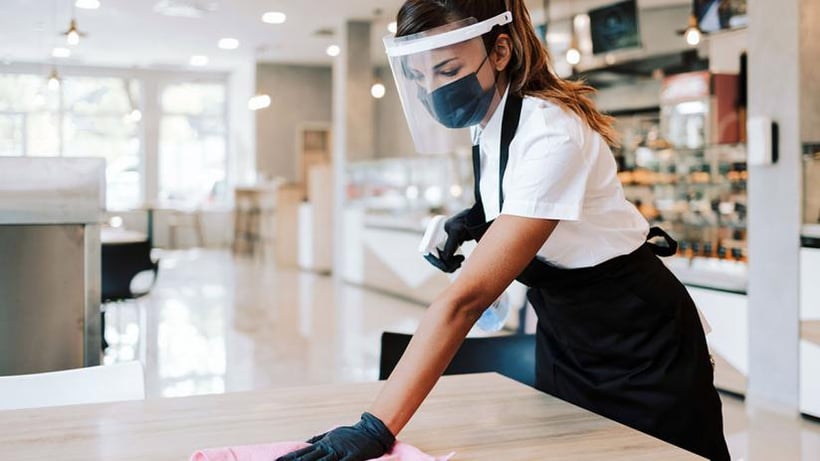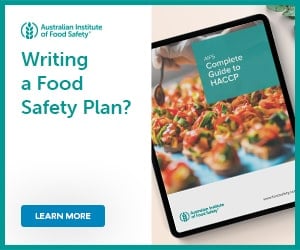
Australia’s public health measures continue to evolve as governments monitor the developing cases of COVID-19 and the effects of the highly contagious Omicron variant. From proof of vaccination requirements, to density limits, to mask mandates and more — here’s a breakdown of the latest restrictions that food businesses need to know by state and territory.
Australian Capital Territory
- Hospitality and entertainment venues such as restaurants, bars, cafes, nightclubs and indoor entertainment venues are permitted to have up to 25 people before density limits apply. A density limit of 1 person per 2 square metres applies for indoor spaces if there are more than 25 people.
- Individuals must be seated while eating and drinking, and dancing is not permitted, at licensed businesses and hospitality venues. Dancing is permitted at weddings, given that density limits are followed on the dance floor.
- Nightclubs are permitted to open with density limits applied, although dancing is not allowed.
- Masks are mandatory in all public indoor settings for people aged 12 and up, including residential aged care facilities, retail, workplaces and hospitality venues except when seated, eating or drinking.
- All organised events must have COVID Safety Plan. Events that are larger than 2,000 attendees must apply for an exemption in accordance with the COVID Safe Event Guidance.
- Events and venues must continue to use the Check In CBR App.
Visit the ACT government website for a list of all current public health measures.
New South Wales
- There are no person limits for hospitality venues or nightclubs. A density limit of 1 person per 2 square metres applies.
- Singing and dancing at nightclubs and hospitality venues are not permitted except for performers who are rehearsing or performing on the premises, wedding services or receptions, or people participating in singing or dancing lessons.
- People attending indoor or outdoor music festivals are not permitted to sing or dance, except for performers who are rehearsing or performing on the premises.
- Proof of vaccination is no longer required at most premises, except for attendees of an indoor music festival with more than 1,000 people or workers in specific industries.
- Masks are mandatory for all people over 12 years old in all indoor public areas.
- COVID-Safe QR check-ins using the Service NSW app are required at restaurants, pubs, small bars, nightclubs, casinos, indoor music festivals with more than 1,000 people, hospitals, residential aged care facilities, retail premises, funerals, memorials and gatherings afterwards.
- Businesses must alert SafeWork if an employee contracted COVID-19 at work or was likely infectious at work.
Visit the NSW government website for a list of all current public health measures.
Northern Territory
- Masks are mandatory for all people aged 12 and up in restaurants, pubs, clubs, shopping centres, workplaces, indoor boat cruises and public transportation including taxis and ride shares.
- Yuendumu and Yuelamu remain in lockout. Outside of the lockout area, people can freely visit hospitality and entertainment venues. Customers must follow the 1.5 metre physical distancing rule.
- Proof of full vaccination is required to enter restaurants, pubs, clubs, casinos, cinemas, theatres and ticketed events of more than 500 people in urban centres or more than 100 people in non-urban centres.
- There are no person limits for attending weddings or funerals outside of lockout areas.
- Businesses must collect customer contact tracing details as part of the COVID-Safe Check-In system, review their COVID-19 Safety Plan every 6 months and appoint a COVID safety supervisor.
Visit the Northern Territory government website for a list of all current public health measures.
Queensland
- Proof of full vaccination is required to enter hospitality venues, indoor entertainment venues, sporting stadiums, theme parks, tourism experiences, indoor or outdoor festivals, government owned museums, galleries or libraries, and vulnerable settings such as hospitals and residential aged care facilities.
- There are no capacity limits for businesses that are only permitted to allow fully vaccinated customers to enter.
- Venues used for private events allowing non-fully vaccinated attendees are limited to a maximum of 20 people or 1 person per 4 square metres, whichever number is lower. This rule applies to weddings.
- Masks are mandatory for people aged 12 and up in all indoor public spaces, including restaurants, pubs, cafes, clubs, cinemas, theatres, supermarkets, indoor stadiums and sports arenas, hospitals, aged care facilities, education facilities, public transportation and ride shares.
- Businesses must use the Check In Qld app for contact tracing purposes.
Visit the Queensland government website for a list of all current public health measures.
South Australia
- Indoor hospitality venues must operate at a density limit of 1 person per 4 square metres, while outdoor venues have a density limit of 1 person per 2 square metres.
- Customers must be seated while eating or drinking indoors, and singing, dancing and communal dining is not allowed.
- There is a capacity limit of 3 people per 4 square metres for seated activities and 1 person per 2 square metres for non-seated activities. This applies to nightclubs, along with weddings and funerals (excluding staff).
- Dancing is not permitted at a nightclub or other licensed businesses except for members of the bridal party at a wedding ceremony or reception. Dancing is permitted as a private activity at an unlicensed premises.
- Singing is permitted indoors so long as the audience wears a mask — performers are exempt.
- Events of more than 1,000 attendees must be outdoors and have a COVID Management Plan in place.
- COVID Marshals and contract tracing must be in place for venues.
- Businesses must use the COVID SAfe Check-In App or other approved contract tracing system.
Visit the South Australia government website for a list of all current public health measures.
Tasmania
- Restaurants, bars, pubs, cafes, clubs, food courts and other hospitality venues can allow up to 250 people in each undivided indoor space and 500 people in each undivided outdoor space. A density limit of 1 person per 2 square metres applies. If the density limit is less than the gathering limit, the lower number applies.
- If all individuals are fully vaccinated or have a valid medical exemption, there are no limits to dancing and drinking while standing at events and venues where alcohol is primarily served.
- Contract tracing using the Check in TAS app is required for customers aged 16 and up at restaurants, pubs, clubs and cafes.
- Masks are mandatory for people aged 12 and up in indoor public spaces including supermarkets, shops, education facilities, workplaces, public transportation and ride shares.
Visit the Tasmania government website for a list of all current public health measures.
Victoria
- Individuals aged 18 and up must provide proof of vaccination before entering hospitality venues such as restaurants, cafes and pubs. These venues must operate at a density limit of 1 person per 2 square metres.
- Indoor dance floors at hospitality and entertainment venues must close. Weddings are exempt.
- Venues are required to ask visitors and staff to use the Service Victoria QR Code app for contact tracing.
- Masks are mandatory for people aged 8 and up in all indoor public settings and outdoor events with more than 30,000 attendees unless seated.
- Wedding ceremonies held at hospitality, community or entertainment venues must follow that venue’s vaccination requirements.
Visit the Victoria government website for a list of all current public health measures.
Western Australia
- Proof of vaccination is required to enter nightclubs, pubs, taverns, hotel hospitality areas, music festivals and events with 500 attendees or more, events with an ‘Occasional Liquor Licence’, the Crown gaming floor and ‘Special Facility Licenses"’ with a capacity of more than 500 people.
- Businesses must have a COVID Safety Plan and use the SafeWA check-in app for contact tracing.
- A COVID Event Checklist is required for events with 500 to 2,500 attendees.
- A COVID Event Plan is required for events with more than 2,500 attendees.
Starting Saturday, February 5, 2022, regions of WA that haven’t reached at least 80 percent full vaccination will need to follow additional restrictions:
- Proof of vaccination will be required to enter restaurants, pubs, bars and dine-in cafes.
- Masks will be mandatory at all indoor public spaces that don’t require proof of vaccination to enter, including supermarkets, takeaway services and roadhouses.
- Only fully vaccinated travellers will be allowed to enter the region via air travel.
Visit the Western Australia government website for a list of all current public health measures.
Relaxed isolation rules for food supply chain workers
On January 10, prime minister Scott Morrison announced relaxed isolation requirements for critical food supply chain workers that have been in close contact with confirmed cases. The country’s strict policy on mandatory isolation for those who have come close to someone infected with COVID-19 will be eased for specific supply chain workers in the food industry.
“Those who are driving the truck to deliver the food, those who are stacking the shelves at night, those who are in the distribution centres, those who are in the abattoirs, those who are in the manufacturing places that are producing food,” Morrison said.
The easing of isolation rules come as an attempt to address food producer shortages in the country. Those who test positive for COVID-19 or are showing symptoms will still be required to isolate.
The Australian Institute of Food Safety (AIFS) is committed to helping food businesses stay safe during the COVID-19 pandemic. Visit our COVID-19 Resource Page for AIFS Members for checklists, guides, templates and fact sheets to help your food business operate through these evolving public health measures.




